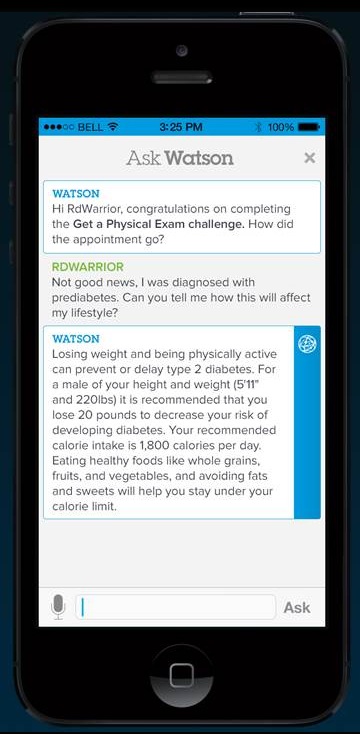 A sample Watson conversation from WellTok.
A sample Watson conversation from WellTok.
It got famous on Jeopardy! and has been keeping its head down "going to med school" in hospitals like Memorial Sloan-Kettering. But now Watson, IBM's "commercial cognitive computer system," is stepping out into the wider world. IBM has opened Watson's application programming interface (API) to developers and two businesses are already working on Watson-powered smartphone apps for healthcare, one for doctors and one for patients.
Watson is able to process questions asked in normal human speech and search large datasets for answers. In addition, Watson learns from each interaction to theoretically provide better and better answers. This means that opening the system's API also helps IBM to build a smarter Watson for future products.
On the provider side, hospital supply chain consulting company MD Buyline is developing an app called "Hippocrates" which doctors will be able to use for both clinical and financial decision support.
"What we've come up with is a very unique application which allows value analysis within hospitals, and it's really around this whole accountable care outcome-based purchasing where hospitals have to provide as much data as possible when determining what to use on a patient," David Rodriguez, VP of Marketing and Solutions Management at MD Buyline, told MobiHealthNews. "If you think about it, the data that's out there is so vast and it's getting so much larger every single day. Even on the medical side, it's really difficult for these teams to curate that information in a meaningful way."
Doctors and hospital administrators can ask Watson questions like "What are the future devices coming out in cardiac rhythm management?" or "Based on my patient mix and demographics, what cryotherapy provider should I be looking at and what sort of services should I think about using them for?" Watson will process the request and return an answer based on data from either MD Buyline or the hospital, including electronic medical records, hospital spending data, claims, cost data, outcomes and quality data, clinical trials and medical journals.
MD Buyline will sell the app to hospitals as an additional product through the same channels it offers consulting services through now. The difference, Rodriguez said, is that Watson can pull in more up-to-date data and can work with larger and more personalized data sets than the company could previously accommodate.
For consumers, WellTok will incorporate Watson into an app called CafeWell Concierge, for users of its existing CafeWell health social network. CafeWell is offered to consumers via population managers that include employers, health plans, and providers. CafeWell Concierge will be a premium offering for these population manager customers. CafeWell has about 17 million consumer users, a few thousand of which will have access to CafeWell Concierge at launch, according to WellTok CEO Jeff Margolis.
By linking to existing CafeWell apps, Watson can answer users based not only on their question but also on specific information like their location, health status, health benefits, health improvement programs and incentives available from their insurer, physician or local pharmacy.
For instance, Margolis said, CafeWell Concierge will notice that it's around dinner time and the user is in a new city, and push the user some restaurant recommendations that line up with health concerns like needing to watch cholesterol or carbohydrates. It will remind the user to schedule a physical, and when they return from the exam, it will reach out and ask them how it went. Margolis used an example patient named Evan.
"Watson actually says 'I saw you had a physical, how did it go?' and Evan says, in natural language, however he wants 'Not so good. I found out I'm prediabetic.'," Margolis told MobiHealthNews. "Watson can distill what it means to be prediabetic and can present that content. CafeWell Concierge, powered by Watson, will give a nice summary of what it is and what it means and it will reference its sources. And now you can say "OK, Watson what do I do?" and it will tell you. And it will connect you to the right programs and activities."
Throughout the process, the app will also offer up rewards for following its suggestions which will translate into savings on healthcare for the user.
The open API means other apps will be able to take advantage of Watson going forward, but WellTok and MD Buyline (along with one non-health related company, Fluid) were handpicked by IBM as early partners.
"First of all, it's one thing to open up APIs. It's another thing to be in a deep partnership with a company," he said. "We've been working with IBM for many months already. Secondly, we and IBM have a partnership agreement that we will take into the marketplace together. And lastly, the business model is complex enough that some generic re-creation is difficult to pull off."
Both apps are due to launch in early 2014. At the moment, neither MD Buyline nor WellTok is planning to launch with voice recognition, but Rodriguez and Margolis both said it's a possibility for the future.
IBM revealed that medicine was a key vertical for putting Watson into action very shortly after the supercomputer famously bested Ken Jennings and Brad Rutter on Jeopardy! in 2011. At the time, MobiHealthNews suggested a Watson-powered Siri-like app for doctors wasn't far off. At the start of 2013, IBM revealed that Watson was being piloted in the oncology units of several hospitals, including Memorial Sloan-Kettering Cancer Center in New York City. IBM continues to work on other hospital clinical decision support tools like CareFlow, a tool for helping doctors assess different treatment possibilities and their historical effectiveness.



















